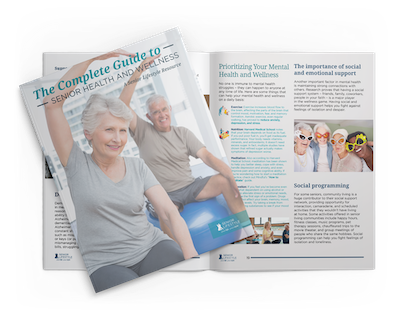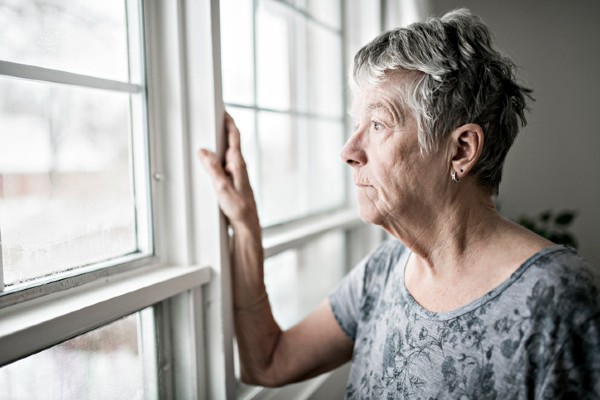According to the U.S. Centers for Disease Control and Prevention, 18.4% of seniors ages 65 and over experienced depression in 2019. Depression also is more likely in women, who outlive men by about five years according to the CDC (80.5 years vs. 75.1 years), meaning they will tend to spend more time alone after the loss of a spouse.
Depression is considered common among older adults, but clinical depression and aging don’t necessarily go hand in hand. Studies, such as a recent one by AARP, consistently find that a majority of seniors are happy with their life.
Find out more about depression in seniors, what signs to look out for, how it’s treated, and how to be supportive of seniors with mental health challenges.
What Is Depression?
Depression is a mood disorder that can affect the way you act, feel and think. Its effects can be different in seniors than among younger people. Among older adults, depression often is tied to medical illnesses and disabilities, and tends to last longer than the same condition in younger people. Even then, depression is not a normal part of aging.
Older adults are often misdiagnosed and therefore may go untreated for depression. Their symptoms may seem to just be a reaction to illness, medication or other life changes. Or, the seniors themselves may not take their symptoms seriously. Depression is serious but treatable.
There are several types of depression that seniors may experience, according to the National Institutes of Health, including:
- Depressive disorder – This disorder can be related to a separate medical condition, like heart disease or multiple sclerosis.
- Major depressive disorder – In this disorder, symptoms can last two weeks or more and will interfere with a person’s ability to perform daily tasks.
- Persistent depressive disorder – This disorder, also called dysthymia, can last more than two years, but the person with it may still be able to perform daily tasks.
- Seasonal affective disorder – This disorder, also called SAD, is characterized by the onset of depression during the winter months, when there is less natural sunlight. This depression generally lifts during spring and summer. Find out more about seasonal affective disorder in seniors.
- Substance/medication-induced depressive disorder – This disorder is related to the use of substances, like alcohol or pain medication.
Signs of Depression in Seniors
Older adults with depression can experience sadness or grief or may have other less obvious symptoms. They may report a lack of emotions rather than a depressed mood.
According to the CDC and the National Institutes of Health, signs of depression may include:
- Anxious, “empty,” or sad mood
- Decreased energy or fatigue
- Difficulty concentrating, making decisions, or remembering
- Early morning wakefulness, excessive sleeping, or insomnia
- Eating more or less than usual
- Feelings of guilt, helplessness, hopelessness, or worthlessness
- Irritability, restlessness, or trouble sitting still
- Loss of interest in favorite activities or hobbies
- Moving or talking more slowly
- Persistent aches or pains, cramps, digestive problems, or headaches
- Thoughts of death or suicide, or suicide attempts
Some of these symptoms can be triggered by other chronic illnesses common among older adults, such as Alzheimer’s disease, arthritis, cancer, heart disease and Parkinson’s disease.

Download The Complete Guide to Health & Wellness for Seniors
As people grow older, their health and wellness needs change. Read our eBook, “The Complete Guide to Health & Wellness for Seniors” for everything you need to know about staying healthy and happy as we age.
Download the Guide
How Depression Is Treated in Seniors
It is important to recognize that depression can be treated, as early as symptoms are seen.
Doctors will first try to rule out medical conditions or medications that may be causing depression, and will adjust as needed. If there is no medical condition found, the patient can be referred to a mental health professional for further treatment.
Treatment for depression commonly includes:
- Counseling or psychotherapy – These methods can help a person identify and change troubling behavior, emotions and thoughts.
- Medications – These can balance hormones that affect mood, such as serotonin. There are many different types of antidepressant medications available.
In many cases, depression can’t be prevented, but there are some steps you can take to benefit your mental health. Among them:
- Be active and exercise.
- Don’t isolate yourself, and let others help you.
- Eat a healthy, balanced diet.
- Educate yourself about depression.
- Get 7-9 hours of sleep a night.
- Participate in activities you enjoy.
- Postpone important decisions.
- Set realistic goals for yourself.
- Stay in touch with friends and family.
- Understand that your mood will improve gradually, not immediately.
How to Be Supportive of Depressed Seniors
Seniors who are facing depression need the support of friends and family. Encouraging them to see a health care provider or mental health professional is important.
You can also help a senior with depression by offering emotional support. Listen with patience and compassion. Seniors don’t expect you to “fix” their situation, but they do want to be heard.
Among the other ways they can be helped through this period:
- Help them stick to their treatment plan, such as setting reminders to take prescribed medications.
- Invite them out for walks, outings and other activities.
- Make sure they have transportation to therapy appointments.
- Note always comments about suicide, and report them to a doctor or therapist.
- Offer them support, understanding, patience and encouragement.
- Remind them that, with time and treatment, the depression will lift.
Find a Safe Place at a Senior Lifestyle Community
Senior communities provide support for senior health and wellness with programs specifically for them. A senior community can:
- Boost cognitive function
- Encourage independence
- Improve quality of life
- Prevent social isolation
- Promote emotional health
Find out more ways senior communities can promote health and wellness. Reach out today to learn more about the programs and amenities at Senior Lifestyle communities that can help you.

